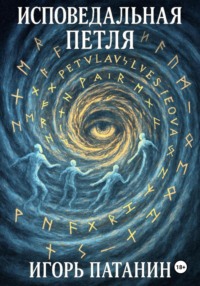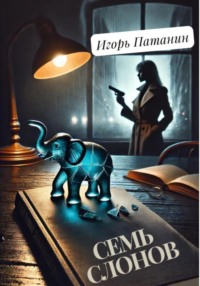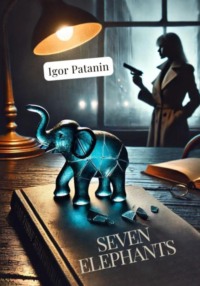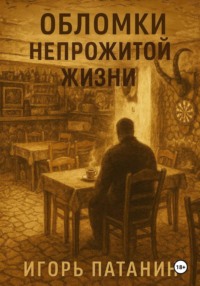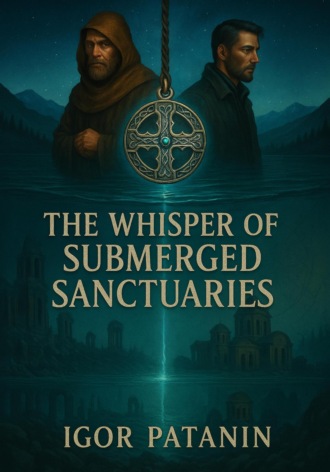
Полная версия
The Whisper of Submerged Sanctuaries
"You think it's connected to the medallion? But how could they have found out?"
"I don't know," Dinara shook her head. "But I have a bad feeling."
They entered the house. Inside it was cool and smelled of herbs. Bakyt led them to the living room, where a table was already set with national dishes—flatbreads, cheese, and jam.
"Bakyt says we should eat something, and then he'll drive us to Ermek in his car," said Dinara. "It'll be safer that way."
"Thank you," Alexei nodded to Bakyt, though he wasn't sure if the man understood Russian.
To his surprise, the man replied in quite decent Russian:
"You're welcome. Dinara's family is my family." He gave Alexei an appraising look. "Are you an archaeologist, like Dinara?"
"Yes," Alexei nodded. "My grandfather worked here on an expedition in 1954."
Bakyt raised his eyebrows in surprise and again spoke to Dinara in Kyrgyz. Their conversation became increasingly animated. Finally, Dinara turned to Alexei:
"Bakyt says his father told stories about a Russian scientist who found something important in the mountains and because of this quarreled with his superiors." She translated a bit more. "He says this scientist secretly met with our grandfather many years later, in the 1980s."
"With your grandfather?" Alexei was surprised. "But why?"
Dinara asked Bakyt the question. He shrugged and answered.
"He doesn't know exactly. He says they would talk privately for hours. Sometimes grandfather would return from these meetings very agitated." Dinara gazed thoughtfully out the window. "Strange that grandfather never told me about this."
At that moment, Bakyt's phone rang. He answered, listening with a serious expression, then quickly said something to Dinara.
"We need to leave," she translated, jumping up. "Two black jeeps have entered the village. They're checking houses."
Alexei felt his heart beat faster.
"Damn, they found us. How?"
"It doesn't matter," Dinara cut him off. "Bakyt will lead us out through the back gate. There's a path that goes through the forest to the road on the other side of the hill. His car is waiting there."
They quickly gathered food for the journey, Bakyt took a hunting rifle and hung it over his shoulder. Dinara put on Alexei's backpack, adding bottles of water to it. Bakyt checked the windows and, making sure the way was clear, led them out through the back door. They crossed the apple orchard and approached a small gate in the far part of the fence. Beyond it, a forest began, stretching up the slope.
"Let's go," said Bakyt. "Quietly and quickly."
They walked along a barely visible path among the trees. The ascent became increasingly steep. Alexei, though in decent shape, began to breathe heavily. Urban life wasn't conducive to developing mountain endurance. Dinara and Bakyt, it seemed, experienced no difficulties, confidently moving forward.
Suddenly, distant barking reached them. Bakyt stopped and listened.
"They've let the dogs loose," he said grimly. "We need to hurry."
They quickened their pace. The path wound between trees, climbing ever higher. Sometimes it almost disappeared, but Bakyt unerringly found the way forward. Finally, they reached a small clearing on the hilltop.
"From here, you can see the village well," said Bakyt, pointing down.
Alexei looked in the indicated direction. Indeed, from this height, the village was laid out before them. Black SUVs stood near several houses. People in dark clothing moved from house to house.
"Who are they?" asked Alexei.
"Karabaev's security," Dinara replied. "At least, that's what Bakyt thinks."
"Could it just be the police?"
Dinara translated the question. Bakyt shook his head and said something.
"He says the police don't drive such cars or act so brazenly. Besides, he recognized one of them—a former special forces soldier who now works for Karabaev."
They continued on their way, now descending the opposite slope of the hill. The path here was wider and more noticeable. Soon they emerged onto a small clearing where an old UAZ stood, camouflaged with branches.
"My car," said Bakyt, removing the branches. "Unassuming, but reliable."
They quickly got into the car. Bakyt started the engine which, to Alexei's surprise, ran quietly and smoothly. Evidently, the car's appearance was deceptive, and the engine was in excellent condition.
"Where to now?" asked Alexei when they drove onto a dirt road.
"To Ermek," Dinara replied. "He should know what's happening. And if Karabaev is really hunting for the medallion, we need help."
They drove along secondary roads, avoiding main highways. Bakyt confidently steered the car through wooded hills and along mountain streams. Sometimes the road became so narrow that tree branches brushed against the windows.
"We're almost at the lake," said Bakyt after a while. "Beyond that pass, you'll be able to see Issyk-Kul."
Alexei waited with anticipation for his first glimpse of the legendary lake. When they reached the pass, a stunning view opened up before them—an enormous blue lake surrounded by snow-capped mountain ranges. The water shimmered in the sun with every shade of blue, from azure to deep indigo.
"Incredible," Alexei exhaled. "Now I understand why there are so many legends about this place."
Dinara smiled.
"That's not all. When you see the sunset over the lake, you'll understand why our ancestors considered it sacred."
Suddenly Bakyt braked sharply and swore in Kyrgyz.
"What happened?" asked Alexei.
Bakyt said something quickly to Dinara, pointing ahead.
"There's a checkpoint ahead," she translated. "Armed men checking all vehicles."
"Police?"
"No," Dinara replied grimly. "They're not in uniform. Bakyt says they're Karabaev's men. They're acting increasingly brazen."
Bakyt turned the car around and drove back.
"Is there another way?" asked Alexei.
Dinara translated. Bakyt nodded and turned onto an even narrower road that seemed to lead straight into the mountains.
"He says there's an old road used only by local shepherds. It will take us to the lake below Cholpon-Ata, but it will take more time."
The road became increasingly difficult. In some places, it was washed out by rain; in others, it was blocked by stones. Bakyt skillfully maneuvered around obstacles, but even his expertise was sometimes tested.
"He's a real ace," Alexei remarked when they passed a particularly challenging section.
"Bakyt was a mountain guide until he injured his knee," said Dinara. "Now he's a farmer, but the skills remain."
Bakyt, hearing his name, smiled and nodded. Then he said something in Kyrgyz.
"He says if you can survive in the mountains, you can survive anywhere," Dinara translated.
They continued driving along the mountain road. The sun was already setting when they finally emerged onto more level ground. Below, the lake shimmered, and on the shore, the lights of a small settlement were visible.
"From here to the nature reserve where Uncle Ermek works is about an hour's drive," said Dinara.
Bakyt said something, pointing to the road ahead.
"He says it will be safer from here on. This isn't a tourist route, mostly locals use it."
They descended to the lake and drove along the shore. The sun had almost disappeared behind the mountains, coloring the water a deep purple. Alexei was enchanted by the view, but anxiety didn't leave him. Who were these people pursuing them? And what was so valuable about the medallion that they were willing to expend so much effort to obtain it?
It quickly grew dark, as often happens in the mountains. Bakyt turned on the headlights, and their beam cut through the darkness, illuminating the narrow road running along the lake. They passed several small settlements where occasional lights glowed.
"We're almost there," said Dinara when they passed a sign reading "Nature Reserve."
The road improved, and light poles appeared. Soon they saw a gate with a sign "Staff Entrance." Bakyt stopped the car and honked three times. After a minute, a guard approached the gate with a flashlight. Dinara lowered the window and said something to him in Kyrgyz. The guard shone his flashlight into the car, carefully examining the passengers, then nodded and opened the gate.
They drove through the gate and headed down an avenue lined with tall pines. At the end of the avenue stood a two-story Alpine-style house with a wide veranda. A light was on on the veranda, and there stood a man whom Alexei had seen in the photograph in Dinara's office—her uncle Ermek.
Bakyt stopped the car, and they got out. Ermek quickly descended from the veranda and embraced Dinara. Then he shook Bakyt's hand, saying something grateful. Finally, he turned to Alexei.
"Welcome, Alexei Igorevich," he said in clear Russian with a slight accent. "I've heard a lot about you from Dinara. And, of course, I knew your grandfather. He was a great man."
He firmly shook Alexei's hand. Ermek had an open face with deep wrinkles from sun and wind, penetrating dark eyes, and a thick, slightly graying mustache. He was dressed simply but neatly—in jeans and a plaid shirt like Dinara's.
"Thank you for the invitation," Alexei replied. "And for your hospitality."
"Come inside," said Ermek, gesturing toward the veranda. "You must be tired from the journey. Dinner is ready, and I have excellent cognac."
They climbed to the veranda. Inside, the house proved spacious and cozy. A large living room with a fireplace, walls hung with photographs of nature and wildlife, bookshelves from floor to ceiling, and a large wooden table already set for dinner.
"Dinara, show Alexei Igorevich to his room," said Ermek. "Meanwhile, Bakyt and I will take care of the car. We need to hide it in the garage so it doesn't attract attention."
The men went out, and Dinara led Alexei up the stairs to the second floor. There was a corridor with several doors.
"This is where the reserve staff live when they're working on long-term projects," she explained. "But now they're all out in the field, so the house is at our disposal." She opened one of the doors. "Here's your room."
The room was small but comfortable. A bed, a desk, a wardrobe, and a window with a view of the lake. On the walls hung photographs of local fauna—snow leopards, argali sheep, golden eagles.
"Make yourself at home," said Dinara. "The bathroom is across the corridor, the second door on the right. Come downstairs when you're ready."
She was about to leave, but Alexei stopped her.
"Dinara, wait. You still haven't told me why you were recording our conversation at the museum."
She froze for a moment, then closed the door and turned to him.
"You noticed," it wasn't a question but a statement.
"Yes," Alexei nodded. "And I turned off the recorder."
Dinara sighed and sat on the edge of the bed.
"I don't just work at the museum," she admitted. "I also consult for a government commission on cultural heritage protection. We track attempts to illegally export artifacts from the country." She looked Alexei in the eyes. "When you called and told me about the medallion, I had to report it. It's part of the protocol." She lowered her eyes. "But when I saw that it was truly what you described… I decided to wait. To understand what it was first."
"You don't trust your superiors?" asked Alexei, sitting down beside her.
"It's not about trust." Dinara shook her head. "It's just that lately, some of the commission's decisions have been… strange. Valuable artifacts were transferred to private collections for 'study.' Documents were forged. Reports of thefts weren't properly investigated." She raised her eyes to Alexei. "And behind many of these stories stands Karabaev's name."
"You think he's bribed commission members?"
"I'm certain of it. But there's no proof." Dinara stood and walked to the window. "So I decided to act at my own risk. I wasn't sure if I could trust you, which is why I recorded our conversation." She turned to him. "I'm sorry."
Alexei was silent for a while, considering what he'd heard. Then he nodded:
"I understand. In your place, I'd probably have done the same."
The tension between them eased somewhat.
"Uncle Ermek is one of the few people I completely trust," Dinara added. "He refused all of Karabaev's offers, though Karabaev offered substantial money for access to certain areas of the reserve. He's incorruptible."
"Good," said Alexei. "Then let's talk to him about the medallion. Perhaps he knows something that will help us unravel this mystery."
Dinara nodded and headed for the door.
"Rest a bit and come down. We'll be waiting downstairs."
Left alone, Alexei approached the window. Beyond it stretched the nighttime Issyk-Kul—a dark mirror of water reflecting the stars and silvered by the moon's path. Somewhere there, in the coastal mountains, possibly lay hidden the secrets of the past and the mysterious "Solomon's Key" mentioned in the inscription on the medallion.
He took the medallion from under his shirt and looked at it closely. In the moonlight streaming through the window, the silver seemed almost luminous. The symbols on the reverse side seemed to pulse, as if trying to tell him something.
Alexei shook his head, dispelling the strange illusion. He was too tired; that's why he was seeing things. Leaving the medallion around his neck, Alexei washed up in the bathroom and went downstairs.
In the living room, Ermek and Dinara were already sitting at the table. Bakyt had apparently left. On the table stood dishes with meat, rice, vegetables, and boorsok—pieces of dough fried in oil. It smelled delicious and appetizing.
"Ah, our guest!" Ermek greeted him. "Sit down, Alexei Igorevich. We need to fortify ourselves before a serious conversation."
Alexei sat at the table, and Ermek poured cognac for himself and Alexei. Dinara declined, preferring tea.
"To our meeting," Ermek proposed a toast, raising his glass. "And to the memory of your ancestors, who were worthy people."
They drank. The cognac was indeed excellent, warming and aromatic.
"Dinara told me about your grandfather and what you found," said Ermek, serving Alexei meat and rice. "It's an amazing story. I remember Professor Sorin, though I was just a boy then. He came several times to meet with my father, Rustam. They would talk for hours in private. About what—I don't know, father never said."
"Is your father still alive?" asked Alexei.
"Yes, thank Allah, he's alive. He's 84 years old and still sturdy, though his health has been failing lately. He lives in a village an hour's drive from here." Ermek sipped his cognac. "He knows local legends and stories better than anyone. If anyone can help unravel the mystery of the medallion, it's him."
"Can we meet him?"
"I think so. But not tomorrow. Tomorrow we should first visit the site of the 1954 excavation. I know where it is. Perhaps we'll find some clues there."
They had dinner, discussing the plan for the next day. Ermek proved to be not only knowledgeable about local history but also a professional geologist specializing in rock formations in the coastal zone of Issyk-Kul. He showed Alexei maps and photographs of the area, noting regions where, in his opinion, Nestorian treasures might be hidden.
"Do you see this line of rock outcrops?" he pointed to a map. "They contain numerous natural grottos and small caves formed by tectonic processes. Some of them could have been used as hiding places. They're difficult to access and not visible from the lake."
"As in the inscription," Alexei noted. "'Light in water, water in light.'"
"Exactly," Ermek nodded. "This phrase has long been known in local folklore, though most consider it just a poetic description of the lake's beauty. But what if it's actually an indication of a hiding place, visible only under certain lighting or reflection from the water?"
Their conversation was interrupted by the sound of an approaching car. Ermek tensed and quickly went to the window, carefully drawing aside the curtain.
"A black jeep," he said grimly. "They've found us."
Dinara jumped to the window.
"Is it them? Karabaev's people?"
"Looks like it," Ermek nodded. "Four of them. Armed."
Alexei felt his heart pounding in his chest.
"What are we going to do?"
Ermek quickly went to the cabinet and took out a hunting rifle.
"We have an advantage—we know the terrain. Behind the house begins the protected area with mountain trails. I know every stone there. We can go through the forest to the eastern part of the reserve, where there's an old observation station."
"What about the reserve guards?" asked Alexei.
"There are only two for the entire area, and right now they're patrolling the far sector," Ermek replied, checking the rifle. "Besides, they can't do much against Karabaev's armed men."
From outside came the sound of footsteps on the veranda. A loud knock on the door. Then a voice:
"Ermek-aga! We know you're in there! Open up, we need to talk!"
"Go away!" Ermek shouted. "This is private property and a nature reserve! You have no right to be here!"
"We have all the necessary documents," the voice replied. "We're acting on behalf of the security services. We're looking for a Russian citizen suspected of attempting to illegally export cultural valuables."
Ermek swore in Kyrgyz.
"Lies. What security services? These are Karabaev's men. Leave through the kitchen, quickly."
Dinara grabbed her jacket and Alexei's backpack.
"Come on!"
They quickly passed through to the kitchen, which was located at the back of the house. Ermek opened a door leading to an inner courtyard.
"Run up the path, straight to the forest. There's a hunting shelter that only I know about. I'll delay them."
"Uncle, no!" exclaimed Dinara. "They're dangerous!"
"Don't argue," Ermek cut her off. "They won't harm me; I'm too well-known a figure. But you… Go. We'll meet at Rustam's."
From outside came a cracking sound—someone was trying to break down the front door. Ermek pushed them toward the exit:
"Run!"
Alexei grabbed Dinara's hand, and they ran out into the yard. The night was clear and moonlit, which was both good and bad—they could see the path, but they could also be spotted. A narrow and steep trail led up the forested mountain slope.
They heard a shot, then shouts. Dinara momentarily stopped, but Alexei pulled her onward:
"We can't go back! Ermek knows what he's doing!"
They ran up the slope, stumbling over stones and roots. Behind them came new voices and the beam of a flashlight sweeping through the trees. They were being pursued.
"This way!" Dinara pulled Alexei off the path, into dense shrubbery.
They squeezed through thick branches and found themselves in a small clearing hidden from the path. They crouched, listening. The steps and voices of their pursuers drew closer. A flashlight beam glided dangerously close to their hiding place.
"They couldn't have gone far!" said one voice in Russian with an accent. "Check the bushes!"
Dinara pressed against Alexei; he could feel her breath and rapid heartbeat. The medallion on his neck suddenly felt heavy and hot, as if heated by an internal fire.
The flashlight beam slid across the bushes behind which they were hiding, paused for a moment, and… continued moving. The pursuers passed them by.
"They probably ran further up the path," said another voice. "Let's go there!"
The footsteps moved away. Alexei and Dinara looked at each other in the half-darkness, not believing their luck.
"How did they not see us?" whispered Alexei.
"I don't know," Dinara whispered back. "But we need to move. They'll soon realize we're not on the path and come back."
They emerged from the bushes and continued on their way, now more slowly and cautiously, moving parallel to the path but staying in the undergrowth. The forest grew denser, and the slope steeper. Finally, they reached a rocky outcrop that provided a view of the lake and the reserve.
"Look," Dinara whispered, pointing down.
Three black jeeps stood by Ermek's house. Flashlight beams darted between the trees—the pursuers continued to search for them.
"We need to keep moving," said Alexei. "Where is this hunting shelter Ermek mentioned?"
"If I understand correctly, it should be higher up the slope, in the rocks," Dinara looked around. "There are several grottos carved by wind and rain in the sandstone. Ermek uses them to observe wildlife."
They continued climbing. The forest gradually thinned, giving way to rocky scree and low shrubs. After half an hour, they reached a rock belt—vertical sandstone walls about ten meters high.
"Now we need to go along the rocks," said Dinara. "The grotto should be somewhere around here."
They moved slowly along the base of the cliffs, carefully examining each crack and depression. The moon illuminated the stones, casting peculiar shadows that sometimes took the form of cave entrances, misleading them.
Finally, Dinara stopped before a small opening, almost completely hidden by shrubs.
"I think it's here," she parted the branches and peered inside. "Yes, definitely. Help me move the brush aside."
Together they cleared the entrance and went in. It was a small grotto, spacious enough to accommodate several people. In the back stood a simple wooden bench, and on a stone ledge serving as a shelf lay canned food, matches, and a kerosene lamp.
"There are even supplies," Alexei said with relief. "Your uncle is well-prepared."
"Ermek is always ready for the unexpected," Dinara lit the lamp, and a soft light illuminated the interior of the grotto. "He says that in the mountains, you need to be prepared for anything—from encountering a snow leopard to a sudden blizzard."
They sat on the bench, resting their backs against the cool stone wall. The tension of the chase gradually subsided, giving way to fatigue.
"What do you think happened to Ermek?" Alexei asked.
"I don't know," Dinara shook her head worriedly. "But I believe he's all right. He's an experienced and respected man; even Karabaev's people wouldn't dare harm him seriously."
"What should we do next?"
"We'll wait here for the night. In the morning, we'll try to reach the village where my grandfather lives. It's about fifteen kilometers from here."
Alexei nodded and unconsciously touched the medallion under his shirt. It still felt warm.
"May I see the medallion?" Dinara asked, noticing his gesture.
Alexei removed the chain from his neck and handed her the medallion. She examined it carefully in the lamplight.
"Amazing craftsmanship," she whispered. "Even today, it would be difficult to create such fine engraving." She turned the medallion over. "And these symbols… some resemble Syriac script, but others… I can't decipher them."
"My grandfather wrote in his diary that he couldn't fully identify them," said Alexei. "And he was a specialist in ancient languages."
Dinara returned the medallion to Alexei.
"Perhaps it's some kind of cipher or conventional notations, understandable only to initiates."
Alexei put the chain back on. The medallion seemed to press against his skin with relief, becoming warm again.
"Strange," he noted. "It's as if… it's alive. Always warm."
Dinara looked at him intently.
"Warm? Are you sure it's not just your own body heat? Metal usually takes on the temperature of the body."
"No, this is different." Alexei shook his head. "It was warm even when I first took it out of the envelope. And… this will sound strange, but sometimes it seems to pulse, as if it has a heartbeat."
Dinara nodded thoughtfully.
"In our mountains, there are legends about sacred objects possessing their own life force. Some shamans believe that certain stones or metals can 'remember' a person's energy or events." She smiled. "Of course, from a scientific perspective, this sounds fantastical. But here, in these ancient mountains, you sometimes start to believe such stories."
They fell silent, listening to the sounds outside. The wind rustled in the shrubs; somewhere in the distance, a night bird called. The pursuers, it seemed, couldn't be heard.
"We need to get some sleep," said Dinara. "Tomorrow we have a long journey ahead."


